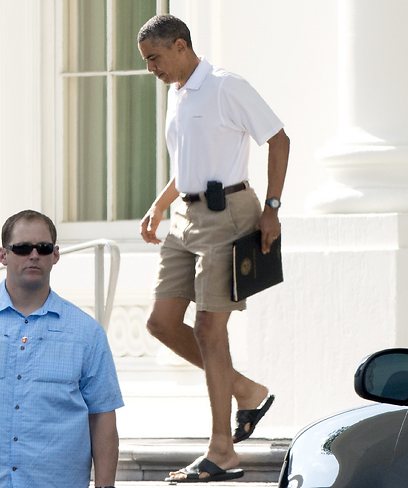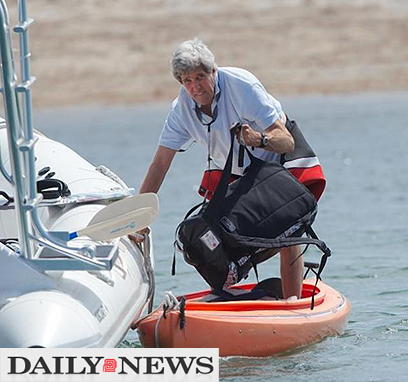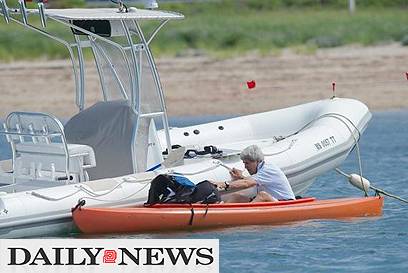US 'not aligned with any particular Egyptian party'
Following criticism over 'ambivalent and aloof' response to Egypt crisis, Obama condemns violence, rejects claims Washington working with 'specific movements to dictate how Egypt’s transition should proceed.' ElBaradei appointment as interim PM put on hold
WASHINGTON – US President Barack Obama, who was criticized over the weekend for his hesitant response to the dramatic developments in Egypt, spoke overnight Sunday with members of the National Security Council to review the "very fluid situation in Egypt."
A statement released by the White House said Obama "condemned the ongoing violence across Egypt and expressed concern over the continued political polarization. He reiterated that the United States is not aligned with, and does not support, any particular Egyptian political party or group.
Related stories:
"In line with that position, the United States categorically rejects the false claims propagated by some in Egypt that we are working with specific political parties or movements to dictate how Egypt’s transition should proceed. We remain committed to the Egyptian people and their aspirations for democracy, economy opportunity, and dignity. But the future path of Egypt can only be determined by the Egyptian people," read the statement.
"During this transitional period, we call on all Egyptians to come together in an inclusive process that allows for the participation of all groups and political parties. Throughout that process, the United States will continue to engage the Egyptian people in a spirit of partnership, consistent with our longstanding friendship and shared interests – including our interest in a transition to sustainable democracy."

Obama heads to the golf course (Photo: EPA)
US Defense Secretary Chuck Hagel held three conversations with the head of Egypt's armed forces on Friday and Saturday, emphasizing the need for "a peaceful civilian transition in Egypt," the Pentagon said on Saturday.
A US official, speaking on condition of anonymity, said the conversations between Hagel and General Abdel Fattah al-Sisi lasted more than two hours, showing the intensive contacts Washington is having with the military leader following last week's overthrow of President Mohamed Morsi.
"In their conversations, Secretary Hagel emphasized the need for a peaceful civilian transition in Egypt," Pentagon spokesman George Little said in a statement.

Kerry in Nantucket
"He also noted the importance of security for the Egyptian people, Egypt's neighbors, and the region."
The Pentagon did not give details of Sisi's reaction.
The New York Times criticized Washington's "largely ambivalent and aloof" response to the crisis in Egypt after reporting that the president, in a polo shirt, shorts and sandals, headed to the golf course Friday morning with a couple of old friends, then flew to Camp David for a long weekend. Secretary of State John Kerry has been criticized for taking time away from the office to chill on his yacht in Nantucket, Massachusetts.

"Aides said both men were updated as increasingly bloody clashes left dozens dead in Egypt, but from outward appearances they gave little sense that the Obama administration viewed the broader crisis in Cairo with great alarm," The New York Times reported.
Meanwhile, the choice of liberal politician Mohamed ElBaradei as interim Egyptian prime minister was thrown into doubt by Islamist objections.
ElBaradei's nomination had been confirmed by several sources and state media on Saturday, but just before midnight a presidential spokesman told reporters that the prime minister had not in fact been chosen.
The abrupt U-turn came amid opposition to the appointment by the Nour Party, Egypt's second Islamist force after Morsi's Muslim Brotherhood movement, highlighting the challenge the military faces in finding consensus among liberals and conservatives on who should run the country.
Clashes between tens of thousands of pro- and anti-Morsi protesters swept the Arab world's most populous nation on Friday and at least 35 people were killed and more than 1,000 wounded.
The violence, which saw rival factions fighting street battles in central Cairo and many others cities and towns, underlined the pressing need for a swift political solution seen as inclusive to all.
"We extend our hand to everyone, everyone is a part of this nation," the spokesman told reporters. "The Muslim Brotherhood has plenty of opportunities to run for all elections including the coming presidential elections or the ones to follow."
Minutes after he spoke, state media reported that the public prosecutor ordered that four top Brotherhood leaders held this week be detained for a further 15 days on accusations that they incited violence against protesters.
The four included Saad el-Katatni, head of the group's political wing, and Khairat El-Shater, its political strategist.
The Brotherhood has said it wants nothing to do with the military's plans for a new interim government. It believes Morsi should be reinstated, and has pledged to keep protesting until he is.
The Nour Party, however, had agreed to the army-backed transition plan leading to new elections. Its withdrawal from the process would strip that plan of vital Islamist support.
And following the Nour rejection, the interim administration headed by Adly Mansour delayed naming the new prime minister.
On Sunday, people were still reeling from one of the bloodiest days in over two years of tumultuous upheaval since autocrat Hosni Mubarak, who ruled for 30 years, was toppled in a popular uprising that was part of the 2011 "Arab Spring."
The Brotherhood called for another day of protest on Sunday, meaning that relative calm on Saturday may prove to be only a temporary lull.
Huge protests were staged on June 30 to pressure Morsi into resigning amid growing anger at economic stagnation and the perception among many that the Brotherhood was seeking to take control of every part of the state - a charge it fiercely denies.
Millions took to the streets to cheer his ouster on Wednesday, but for many Islamists it was a bitter reversal that raised fears of a return to the suppression they endured for decades under autocratic rulers.
The military said it had not carried out a coup, but merely enforced the will of the people.
The events of the last week have raised alarm among Egypt's allies in the West, including main aid donors the United States and the European Union, and in Israel, with which Egypt has had a US-backed peace treaty since 1979.
Reuters contributed to the report
- Receive Ynetnews updates
directly to your desktop















